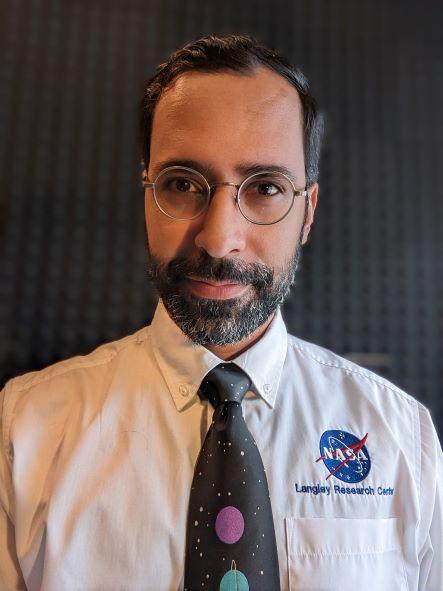Meet Sepehr Bastami, an aerospace research engineer at NASA’s Langley Research Center in Hampton, Virginia. Bastami conducts cutting-edge aeronautics research, serving on two projects related to sustainable aviation and human contributions to safety in aviation.
Prior to joining NASA, Bastami earned his bachelor’s and master’s degrees from the Cockrell School of Engineering at The University of Texas at Austin, where he studied under Zoltan Nagy, Ph.D. and Kerry Kinney, Ph.D.
“Drs. Kinney and Nagy are phenomenal mentors. Their mentorship styles are unique and impactful. They build close personal relationships with their students and maintain open channels of communication. I first learned about the Whole Communities—Whole Health research grand challenge in 2018 when Dr. Nagy invited me to be a part of the team, which is where I also met Dr. Kinney. Dr. Nagy has been one of the most influential mentors I’ve ever had, and his mentorship has been a critical factor in my success.” Bastami said.
Bastami credits his time working with the Whole Communities—Whole Health research grand challenge with helping him land his job at NASA.
“UT’s motto is what starts here changes the world, which in my case has been true – at least in terms of aeronautics research. The interdisciplinary research opportunities afforded to UT students help them get jobs because impactful projects at organizations like NASA are interdisciplinary,” Bastami said.

“As long as UT continues to afford students those interdisciplinary research opportunities, it can continue to generate a workforce that changes the world.”
Bastami was drawn to the Whole Communities—Whole Health research grand challenge because it provided him an opportunity to serve the community.
Along with other researchers, Bastami helped to design and develop an environmental data acquisition device used in Whole Communities—Whole Health’s five-year cohort study to understand the physical, mental, and emotional health effects of environmental factors in underserved communities. The device contains sensors that collect environmental data – including light pollution, temperature, and air quality – using available low-cost technologies.
“UT’s motto is what starts here changes the world, which in my case has been true – at least in terms of aeronautics research. The interdisciplinary research opportunities afforded to UT students help them get jobs because impactful projects at organizations like NASA are interdisciplinary,” Bastami said.
“We built a device that conceptually has the potential to highlight the environmental disadvantages faced by underserved communities. We could amplify their voices through data and change their lives by potentially convincing policymakers to move a landfill or reduce sound and light pollution in a given neighborhood,” Bastami said.
Looking ahead, Bastami hopes to develop his career as a civil servant at NASA in different areas of research and engineering. While he has always been fascinated by space exploration, Bastami appreciates the broad impact of NASA’s aeronautics research on the daily lives of people.
“The reason air travel in the U.S. is so safe is because of NASA’s aeronautics research in collaboration with the Federal Aviation Administration, airlines, and companies like Boeing. The first A in NASA is aeronautics, so remember: NASA is with you when you fly,” Bastami said.
Learn more about the Whole Communities—Whole Health research grand challenge.

